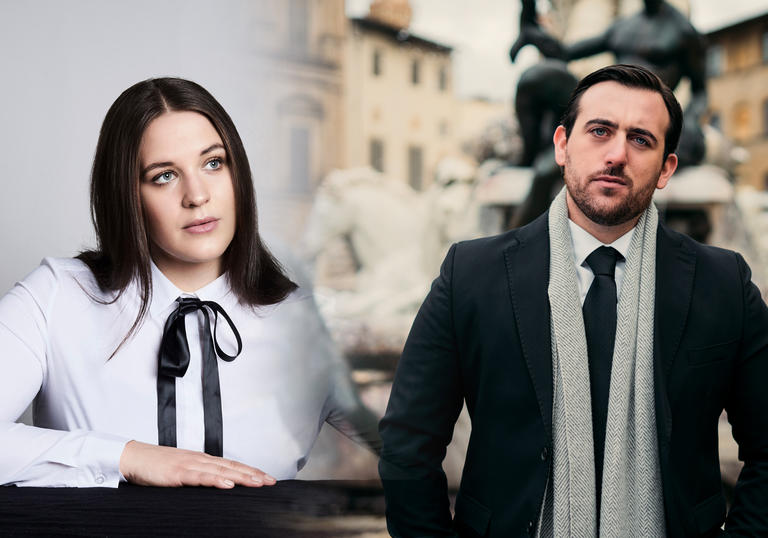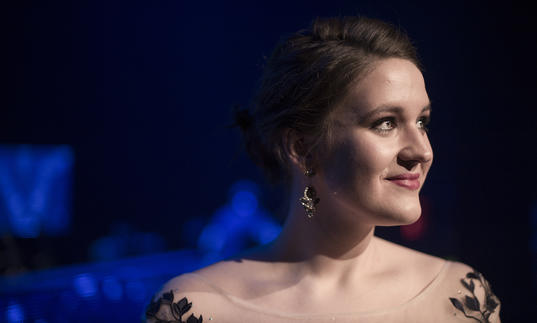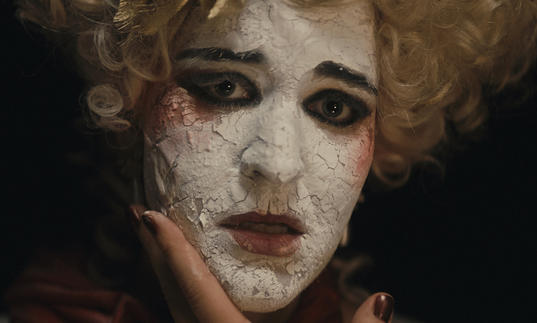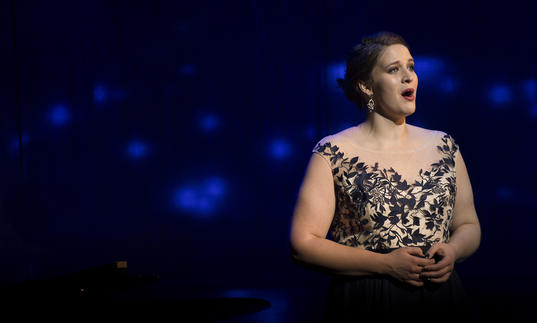
Programme and performers
Richard Wagner 'Dich teure Halle' from Tannhäuser
Giuseppe Verdi 'La mia letizia' from I Lombardi
'Teco io sto' and 'Morrò, ma prima in grazia' from Un Ballo in Maschera
'Cielo pietoso, rendila' from Simon Boccanegra
Giuseppe Verdi 'Ave Maria' from Otello
Umberto Giordano 'Amor ti vieta' from Fedora
Giacomo Puccini 'Vissi d'arte' from Tosca
Francesco Cilea 'Lamento di Federico' from L'arlesiana
Pyotr Ilyich Tchaikovsky 'Uzh polnoch´ blizitsya..' and 'Akh! istomilas ya gorem' from Queen of Spades
Ernest Charles When I have sung my song to you
Landon Ronald O Lovely Night
Paolo Tosti L'alba separa dalla luce l'ombra
Non t'amo piu
Ideale
Salvatore Cardillo Core'ngrato
Frederick Loewe I could have danced all night
Franz Lehár 'Lippen Schweigen' from The Merry Widow
Lise Davidsen soprano
Freddie De Tommaso tenor
James Baillieu piano
Part one
Elisabeth
Dich, teure Halle, grüss’ ich wieder,
Froh grüss’ ich dich, geliebter Raum!
In dir erwachen seine Lieder
Und wecken mich aus düstrem Traum.
Da er aus dir geschieden,
Wie öd’ erschienst du mir!
Aus mir entfloh der Frieden,
Die Freude zog aus dir.
Wie jetzt mein Busen hoch sich hebet,
So scheinst du jetzt mir stolz und hehr;
Der dich und mich so neu belebet,
Nicht länger weilt er ferne mehr.
Wie jetzt mein Busen hoch sich hebet, etc.
Sei mir gegrüsst! Sei mir gegrüsst!
Du, teure Halle, sei mir gegrüsst! etc.
Libretto by Richard Wagner
Elisabeth
You, blessed hall, I greet again,
I greet you with joy, beloved place!
In you his songs awake
and rouse me from my gloomy dreams.
Since he left you,
how desolate you have appeared to me!
Peace fled from me,
joy took leave of you.
As now my breast swells full of joy,
you seem to me sublime and proud;
he who revives both you and me
is no longer far away.
As now my breast swells full of joy etc.
I salute you! I salute you!
You, blessed hall, I salute you! etc.
Translation by Inge Moore and Gery Bramall, reproduced with kind permission from Chandos Records
Part two
Tosca
Vissi d’arte, vissi d’amore,
Non feci mai male ad anima viva! …
Con man furtiva
Quante miserie conobbi, aiutai …
Sempre con fe’ sincera,
La mia preghiera
Ai santi tabernacoli salì.
Sempre con fe’ sincera
Diedi fiori agli altar.
Nell’ora del dolore
Perché, perché, Signore,
Perché me ne rimuneri così?
Diedi gioielli
Della Madonna al manto,
E diedi il canto
Agli astri, al ciel, che ne ridean più belli.
Nell’ora del dolor,
Perché, perché, Signor,
Perché me ne rimuneri così?
Libretto by Luigi Illica and Giuseppe Giacosa
Tosca
Art was my life, love was my life,
I never hurt a living soul! …
Secretly,
how many times did I help the unhappy …
Ever with sincere faith
did my prayer
rise to the holy altars.
Ever with sincere faith
did I lay flowers upon the altars.
In my hour of grief
why, oh why, Lord,
why must this be my reward?
I gave jewels
for Mary’s cloak,
and gave my song
to the stars, to the sky, making them more beautiful.
In my hour of grief
why, oh why, Lord,
why must this be my reward?
Translation by Emanuela Guastella, reproduced with kind permission from Chandos Records
Artist biographies
Barbican’s Artist in Spotlight, Norwegian soprano Lise Davidsen has been hailed ‘opera’s newest star’ (The Economist) and has taken the classical music world by storm ever since winning the much-coveted Operalia competition in 2015.
This season, Davidsen’s highlights include a triple appearance at the Metropolitan Opera as Eva in Die Meistersinger von Nürnberg, the title role of Ariadne auf Naxos, and as Chrysothemis in Elektra; a double appearance at the Wiener Staatsoper as Ellen Offord in an all-star performance of Britten’s Peter Grimes, as well as Sieglinde in Die Walküre; and Leonore in Fidelio at Maggio Musicale in Florence. On the concert platform, she joined the Orchestra de Paris for Strauss Op 27 and was featured as the soprano soloist in the Boston Symphony Orchestra tour. In June this year she makes her debut with the Berliner Philharmoniker and Kirill Petrenko with Zemlinksy’s Lyric Symphony.
Recently announced as the star of BBC’s Last Night of the Proms, Davidsen’s highlights this summer include a double appearance at the Bayreuth Festival: Elisabeth in Tannhäuser and Sieglinde in Die Walküre in a new production of Wagner’s Ring Cyle and appearances in recital at the Bergen, Turku and Peralada Festivals. UK audiences can see Davidsen take on the Royal Opera House stage next season with one of her signature roles: Elisabeth in Wagner’s Tannhäuser as well as a role debut as Elisabetta in Verdi’s Don Carlo.
In August 2020, she was one of the first stars featured by the Metropolitan Opera as part of their celebrated series: Met Stars Live in Concert. Davidsen’s rendition of Grieg’s En Svane and Ved Rondane was then broadcast together with the New Year Speech of King Harald V of Norway. In May 2021 she was awarded Female Singer of the Year by the International Opera Awards.
‘It’s been a long time since a singer has generated as much buzz,’ wrote Gramophone in the review of her debut album for Decca, which debuted at number one in the 2019 UK Classical charts. Since then, she has released two further solo albums on the label to equal acclaim: an orchestral recital of Beethoven, Wagner and Verdi, and a stunning Grieg recital with Leif Ove Andsens.



